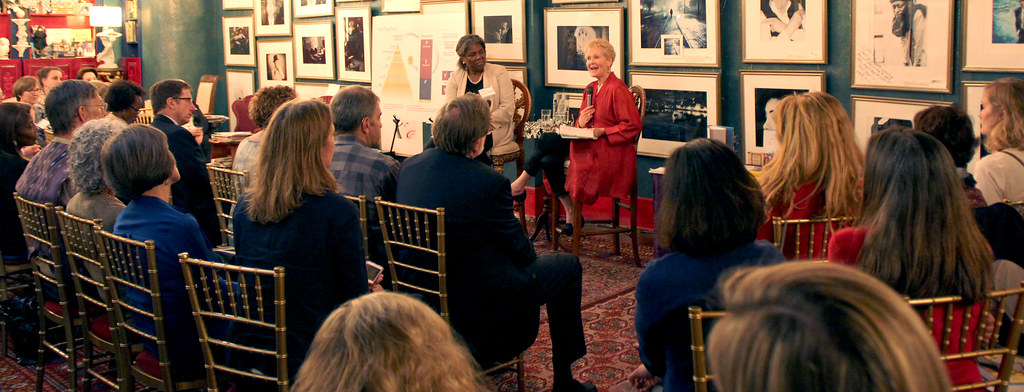How Women Rescued Rwanda and Set a Global Example
The women of Rwanda are raising their voices.
Rwandan Women Rising, a new book by Swanee Hunt, celebrates these women’s awe-inspiring achievements—and lets them explain in their own words how they changed their country and our world.
These stories are ferocious yet ultimately courageous. The women do more than recall the horrors of the 1994 genocide that claimed nearly one million lives in an explosion of ethnic conflict. They also explain how they rescued and rebuilt their East African homeland.

Ambassador Swanee Hunt reads an excerpt from her new book, Rwanda Women Rising. The book includes more than 80 stories of Rwandan women and how they rebuilt their country after the genocide in 1994.
In the process, these women have set an essential example for countries around the world: they show us how women’s leadership holds the key to lasting peace and security.
Swanee, the founder and chair of Inclusive Security, introduced the book publicly at a launch event in Washington on May 22.
Swanee began by remembering the late Aloisea Inyumba, the humble Rwandan woman who led the National Unity and Reconciliation Commission, among her many roles. Inyumba roamed the country relentlessly to advance the innovative grassroots justice system that moved Rwanda toward reckoning and healing. Swanee said of her: “In a country where everything had gone wrong, she epitomizes everything that went right.”
Swanee also read from one of the more than 80 personal stories recounted in the book—that of Godelieve Mukasarasi, a counselor specializing in trauma. Godelieve founded a group to support women who had survived rape during the genocide, but were often ostracized. She recalled how women rose up to protest when they heard that a new law would treat rape “like stealing someone’s baskets or sweet potatoes. The message was that a woman was just a piece of property that could be looted.”
Godelieve led a campaign that included rape survivors’ tormented testimony to Parliament. This led to a new law in which rape during the genocide was classified as a war crime—a momentous change now cited around the world.
This victory was just one of many by women who stepped into the chaotic vacuum left by the slaughter. Women created entire new levels of political involvement, and now hold 64 percent of the seats in Parliament, far higher than anywhere else in the world. They transformed healthcare, education, and the justice system itself, turning Rwanda into a role model for African economic development.
These changes unfold through the voices of more than 80 women (and a few men). Their interviews form the backbone of the book—conducted over 17 years. Swanee offered a warm shout-out to Laura Heaton, an American journalist based in Kenya who worked closely with Swanee for four years, conducting many interviews and helping shape the narrative.
The moderator, veteran U.S. diplomat Linda Thomas-Greenfield, opened the evening with a devastating personal memory of her own: She was visiting Rwanda in April 1994 when the genocide began; the Americans tried but failed to give refuge to the moderate Hutu prime minister, Agathe Uwilingiyimana, who was being chased by the Hutu extremists. Militiamen burst into the American residence and Linda found herself with a gun in her face; She persuaded him not to shoot, and the soldiers finally left. Soon after, she heard the screams of the woman prime minister as she was gunned down in the street beyond the wall.

Ambassador Linda Thomas-Greenfield, former Assistant Secretary for the Bureau of African Affairs, shares her experience in Rwanda at the start of the genocide. She said her time in Rwanda defined her perspective and her leadership through her career of public service.
Linda later served as U.S. Ambassador to Liberia and went on to become the State Department’s Assistant Secretary for African Affairs. But she said her time in Rwanda defined her perspective and her leadership through her career of public service.
Swanee, in turn, served as U.S. Ambassador to Austria during the Clinton Administration, and had her own harrowing moments negotiating among warring parties in the former Yugoslavia—conflicts that sparked her decades of work to advance women as decision-makers to prevent, resolve, and recover from conflict. She created Inclusive Security, the Washington-based non-profit that has supported women’s leadership in building peace and security globally since 1999. The Rwandan experience is a towering example of these ideas put to best use.
Swanee said Rwandan women drew inspiration from women in other countries in the years following the genocide, “so it feels like sweet justice that Rwandans are the teachers, sharing their hard-earned wisdom with all of us.”
More Photos From the Event
Want to share our posts? Great! Read our use policy here.

